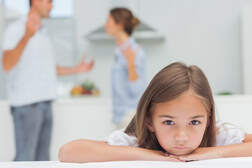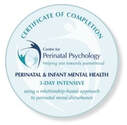Perinatal or Post-Natal Depression and Anxiety
Pre and post-natal depression and/or anxiety can impact the early parenting experience in lasting ways. Approximately 1 in 7 women will experience PND (Post-Natal Depression) and research has revealed that PND can happen to fathers too. It is now recognised that PND can be present in the ante-natal period (i.e., during pregnancy). The sooner either parent seeks assistance the better the outcome for all, although it's never too late.
What causes Post-Natal Depression?
Most women will get teary a few days after the birth of a baby when their hormones suddenly change. This is normal and will pass when the major hormonal readjustment has calmed down. Then the new mother must adjust to the many changes a new baby brings.
Why any woman gets Post-Natal Depression depends on several factors:
Sleep deprivation can be a huge shock to many, especially to women who needed 8-9 hours prior to being pregnant.
Biochemical changes can trigger an imbalance in neurotransmitters that can manifest in symptoms of anxiety and depression.
The mother has massively increased demands on her time, energy and body.
Breastfeeding doesn't always go as expected and can be painful.
Lack of support for the new mother amplifies the effect of increased demands.
Sometimes mum is an 'A-type' who wants to flip back to being a super-energetic, organised woman. This can lead to depletion of resources.
Beliefs can sneak in that other mothers 'have it all together' and the new mum is failing.
Feelings of being overwhelmed or being inadequate can take over and lead to excessive worry.
Thoughts of "Am I doing this right?" and "What am I doing wrong that my baby won't sleep?" can lead to feelings of guilt or resentment.
Body image issues can certainly manifest as the woman realises her body is not going to ping back to its pre-baby shape.
Sometimes it was the birth itself that was traumatic or did not turn out how the mother imagined it.
If the mother has any personal or family history of depression or anxiety, symptoms can manifest now due to the stress of parenting.
Past issues with the new mother's own childhood can be triggered by the experience of becoming a parent.
Women need to know they are not to blame for how they feel and that it doesn't mean they are a bad parent or a lesser person. The whole physiological process of giving birth to and then caring for a baby is enormous. Post-natal depression is real, recognised, and significant. The sooner it is treated the better for all, especially your baby.
If you are feeling down for an ongoing period of time, then please seek help.
If you have had bad thoughts about your baby and fear what you might do, please contact your doctor, hospital or child health nurse immediately or call lifeline on 13 11 14.
Post-Natal Depression counselling with a doctor's referral will qualify for the medicare subsidy of $86.15 to help with session fees.
What causes Post-Natal Depression?
Most women will get teary a few days after the birth of a baby when their hormones suddenly change. This is normal and will pass when the major hormonal readjustment has calmed down. Then the new mother must adjust to the many changes a new baby brings.
Why any woman gets Post-Natal Depression depends on several factors:
Sleep deprivation can be a huge shock to many, especially to women who needed 8-9 hours prior to being pregnant.
Biochemical changes can trigger an imbalance in neurotransmitters that can manifest in symptoms of anxiety and depression.
The mother has massively increased demands on her time, energy and body.
Breastfeeding doesn't always go as expected and can be painful.
Lack of support for the new mother amplifies the effect of increased demands.
Sometimes mum is an 'A-type' who wants to flip back to being a super-energetic, organised woman. This can lead to depletion of resources.
Beliefs can sneak in that other mothers 'have it all together' and the new mum is failing.
Feelings of being overwhelmed or being inadequate can take over and lead to excessive worry.
Thoughts of "Am I doing this right?" and "What am I doing wrong that my baby won't sleep?" can lead to feelings of guilt or resentment.
Body image issues can certainly manifest as the woman realises her body is not going to ping back to its pre-baby shape.
Sometimes it was the birth itself that was traumatic or did not turn out how the mother imagined it.
If the mother has any personal or family history of depression or anxiety, symptoms can manifest now due to the stress of parenting.
Past issues with the new mother's own childhood can be triggered by the experience of becoming a parent.
Women need to know they are not to blame for how they feel and that it doesn't mean they are a bad parent or a lesser person. The whole physiological process of giving birth to and then caring for a baby is enormous. Post-natal depression is real, recognised, and significant. The sooner it is treated the better for all, especially your baby.
If you are feeling down for an ongoing period of time, then please seek help.
If you have had bad thoughts about your baby and fear what you might do, please contact your doctor, hospital or child health nurse immediately or call lifeline on 13 11 14.
Post-Natal Depression counselling with a doctor's referral will qualify for the medicare subsidy of $86.15 to help with session fees.
When 2 Become 3: Postnatal Relationship Problems
Relationship issues in the post-baby period can occur for many reasons and your partner can attend sessions with you. Working together, both of you can work on the adjustment to parenting a new baby and on any relationship issues that have arisen. It is important that you each understand what is happening and know how best to cope at this time. It is now recognised that men experience some form of post-natal depression also. PND in the mother can be bewildering for the father, who is likely going through his own adjustment period. Dads are in the best position to support mum, especially in the absence of extended family help.
Relationship problems can arise when a new baby comes along, due to the transition from being a couple to a trio. It's a fertile time for arguments over housework and sex, and problems with in-laws can also flare up. The post-baby period, especially between 6 weeks to 4 months, is a time where big arguments can happen between couples. Sometimes things pass and others times this can be a sign of something more significant going on.
Relationship problems can arise when a new baby comes along, due to the transition from being a couple to a trio. It's a fertile time for arguments over housework and sex, and problems with in-laws can also flare up. The post-baby period, especially between 6 weeks to 4 months, is a time where big arguments can happen between couples. Sometimes things pass and others times this can be a sign of something more significant going on.
Clarissa's Perinatal Training and Experience
Clarissa has completed the Australian Psychological Society's training in Perinatal counselling and the intensive workshop offered by the Centre for Perinatal and Infant Mental Health. Previously Clarissa was a breastfeeding counsellor with the Nursing Mothers Association (now Breastfeeding Australia) where she educated and supported new mothers and facilitated groups. While professional skills and experience are important, often life experience is the greatest educator. Clarissa has 5 children (yes 5!) who now range in age from 12-22.

Parent counselling - Relationship problems around parenting - dealing with childrens behaviour as a couple can be challengeing when you both have different ideas about child rearing or if your child appears 'difficult' - read more.
*Please note I do NOT see children - I work with the parents only.
*Please note I do NOT see children - I work with the parents only.



